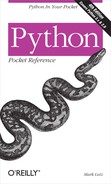This section discusses rules for name binding and lookup (see also the sections Name format and Name conventions). In all cases, names are created when first assigned but must already exist when referenced. Qualified and unqualified names are resolved differently.
Qualified names (X, in
object.X) are known as attributes and live in object namespaces. Assignments in some lexical scopes[4] initialize object namespaces (modules, classes).
Assignment: object.X = valueCreates or alters the attribute name
Xin the namespace of theobjectbeing qualified.Reference: object.XSearches for the attribute name
Xin theobject, then all accessible classes above it (for instances and classes). This is the definition of inheritance.
Unqualified names (X) involve lexical scope rules. Assignments bind such names
to the local scope unless they are declared global.
Assignment: X = valueMakes name
Xlocal by default: creates or changes nameXin the current local scope. IfXis declaredglobal, this creates or changes nameXin the enclosing module’s scope. IfXis declarednonlocalin Python 3.0, this changes nameXin an enclosing function’s scope. Local variables are stored in the call stack at runtime for quick access.Reference: XLooks for name
Xin at most four scope categories: in the current local scope (function); then in the local scopes of all lexically enclosing functions (if any, from inner to outer); then in the current global scope (module); then in the built-in scope (which corresponds to modulebuiltinsin Python 3.0, and module__builtin__in Python 2.X). Local and global scope contexts are defined in Table 1-17.globaldeclarations make the search begin in the global scope instead, andnonlocaldeclarations restrict the search to enclosing functions.
Table 1-17. Unqualified name scopes
Code context | Global scope | Local scope |
|---|---|---|
Module | Same as local | The module itself |
Function, method | Enclosing module | Function call |
Class | Enclosing module |
|
Script, interactive mode | Same as local |
|
| Caller’s global (or passed in) | Caller’s local (or passed in) |
The enclosing functions search of the last rule
in the previous section (Reference:
X) is called a statically nested
scope, and was made standard in version 2.2. For example,
the following function now works because the reference to x within f2 has access to the scope of f1:
def f1():
x = 42
def f2():
print(x)
f2()In Python versions prior to 2.2, this function fails because
name x is not local (in f2’s scope), global (in the module enclosing
f1), or built-in. To make such
cases work prior to version 2.2, default arguments retain values from
the immediately enclosing scope (defaults are evaluated before
entering a def):
def f1():
x = 42
def f2(x=x):
print(x)
f2()This rule also applies to lambda expressions, which imply a nested
scope just like def and are more
commonly nested in practice:
def func(x):
action = (lambda n: x ** n) # works as of 2.2
return action
def func(x):
action = (lambda n, x=x: x ** n) # use before 2.2
return actionDefaults are still sometimes needed to reference loop variables when creating functions inside loops (they reflect their final loop value). Scopes nest arbitrarily, but only enclosing functions (not classes) are searched:
def f1():
x = 42
def f2():
def f3():
print(x) # found in f1's scope
f3()
f2()[4] Lexical scopes refer to physically (syntactically) nested code structures in a program’s source code.
